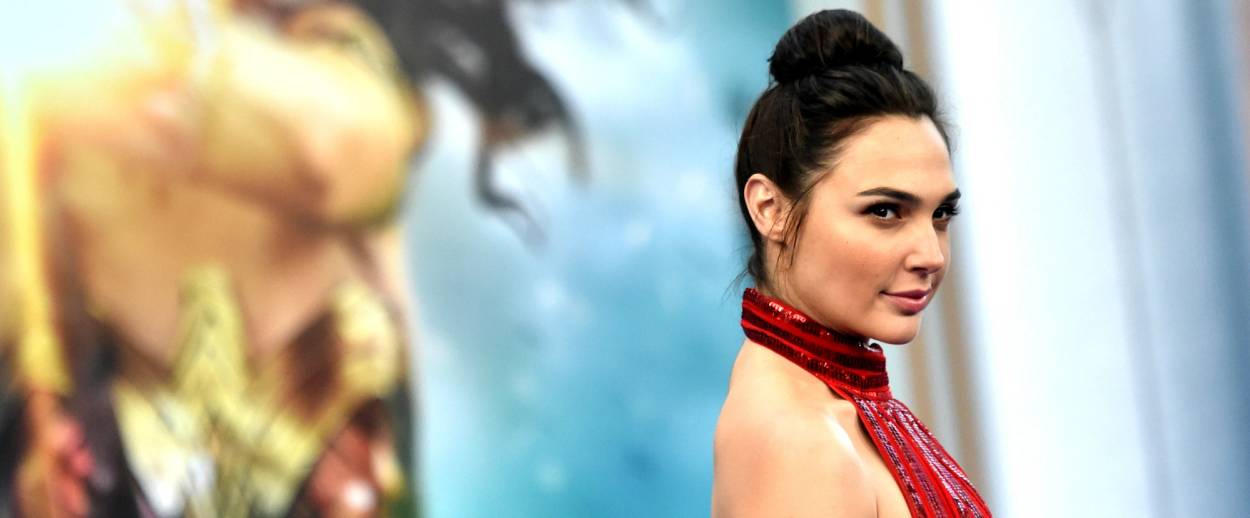Amid Wide Praise, ‘Wonder Woman’ Gets Banned in Lebanon
The film was banned because its lead, Gal Gadot, is Israeli and a former IDF soldier




The aggrieved Men’s Rights Activists of Beirut can breathe a sigh of relief—there won’t be any women-only screenings of Wonder Woman in Lebanon to hurt their precious fee-fees (excuse me, I meant strong, virile, stoic, masculine pride). That’s because the DC superhero film—its best-reviewed since 2008’s The Dark Knight—has been abruptly banned in Lebanon. And no, it’s not because of its feminist message or patriotic bustier-and-hot-pants combo. The Lebanese ministry at the last minute banned the film because of its star Gal Gadot, who is Israeli in case you haven’t heard, and a former IDF soldier.
#WonderWoman has been banned in #Lebanon.
— Grand Cinemas (@GCLebanon) May 31, 2017
Screenings for #WonderWoman have been cancelled tonight, the film is no longer debuting tomorrow in cinemas across Lebanon.
— Warner Bros. Lebanon (@wbpictureslb) May 31, 2017
The two neighboring countries are not on the best of terms; a decade ago, Israel and Hezbollah engaged in a 34-day war. But this movie kerfuffle appears to be related more towards the BDS campaign (and banning movies is not unheard of for Lebanon). As The Atlantic reports:
Though it had passed the country’s screening procedures and was widely promoted leading up to the premiere, the film’s release prompted an outcry from the Campaign to Boycott Supporters of Israel-Lebanon, a Lebanese group that urged the government to block what it described as the “Israeli Soldier film,” in apparent reference to Gadot’s service in the Israeli army—a conscription that is mandatory for most Israeli citizens.
The Facebook page of the organization that reportedly “urged” the Lebanese government to ban the film links to a general BDS campaign against Israel, which states that buying Israeli goods is funding apartheid. Curiously, Lebanon did not ban other Gadot films in the past, including one in which she played a role as Wonder Woman. I haven’t heard anything about, say, Natalie Portman’s movies being banned in Lebanon (or given the makeup of Hollywood, movies in general. But I’m probably not supposed to say that out loud.)
In a 2016 interview, Gadot told Glamour: “I wish no country had the need for an army. But in Israel, serving is part of being Israeli. You’ve got to give back to the state. You give two or three years, and it’s not about you. You give your freedom away. You learn discipline and respect.” Nothing crazy here, just the facts. In the past Gadot has posted political statements on social media, some of which have since disappeared, including a post critical of Hamas on her Instagram account. One here, on Facebook, shows her lighting Shabbat candles and criticizing Hamas. Lebanon, or Hezbollah for that matter, does not appear to be a country or group she has directly called out. And so it appears that the bulk of this Lebanese Wonder Woman “boycott” seems to simply stem from the fact that she is Israeli and therefore, some type of enemy.
Does this mean that Gal Gadot—and by virtue of her job as Wonder Woman—support the occupation and therefore must be punished and shamed for it by depriving Warner Brothers of the lucrative Lebanese audience for their film? (Other Arab countries, for what it’s worth, seem to have fewer qualms; the film will open as scheduled in the UAE, Bahrain, Qatar, and Oman.) Who knows, but I wouldn’t blame Gadot, a proud—and beloved—Israeli, if she never opened her mouth about anything again. That she feels compelled to stand up for her country and her experiences there—however morally ambiguous they may be, or she may find them to be—speaks to her character, regardless of what she may be willing to say behind closed doors. And the Lebanese government is of course free to do whatever they think is best, although frankly, with that kind of projected box office, I doubt Warner Brothers is sweating it too hard.
But the boycott the film is now linked to speaks to a larger danger of the current moment, where the world as a whole seems dangerously and increasingly unable to understand context, to allow shades of grey or the benefit of the doubt, to tell the difference between fantasy and reality, to distinguish an actor from the role she plays. The Lebanese people will live without seeing Wonder Woman in the theater—and they can always just illegally pirate it anyway, just as the Internet intended. But a world with this kind of misplaced accountability, that reflexively brings down the curtain on anything that might challenge our personal worldview? That’s the kind of the place even a powerful female superhero can’t do much to fix.
Previous: It’s Gal Gadot’s (and Israel’s) Time to Shine
Related: Lessons, Reflections, and Responsibility: The Second Lebanon War
Rachel Shukert is the author of the memoirs Have You No Shame? and Everything Is Going To Be Great,and the novel Starstruck. She is the creator of the Netflix show The Baby-Sitters Club, and a writer on such series as GLOW and Supergirl. Her Twitter feed is @rachelshukert.